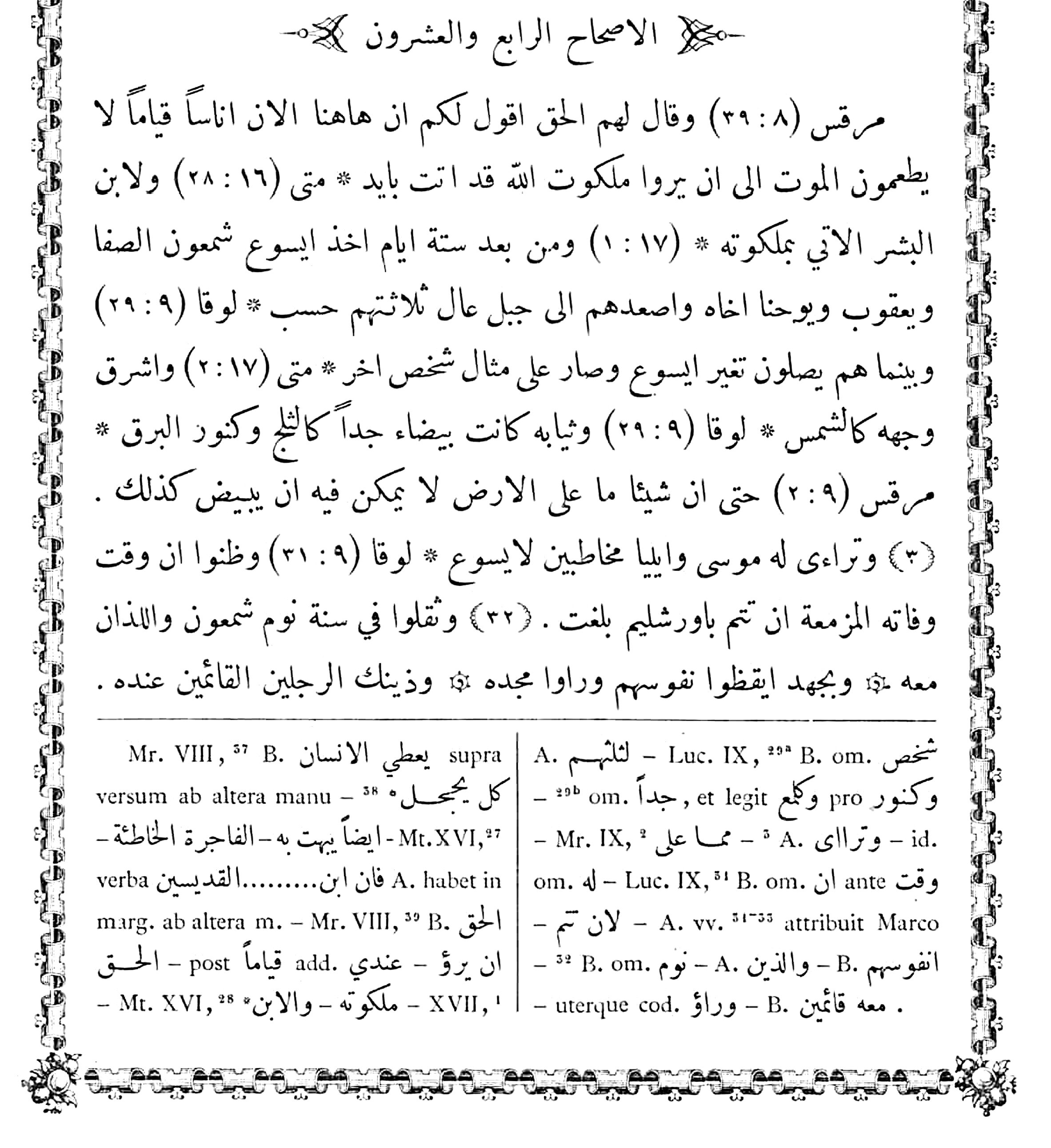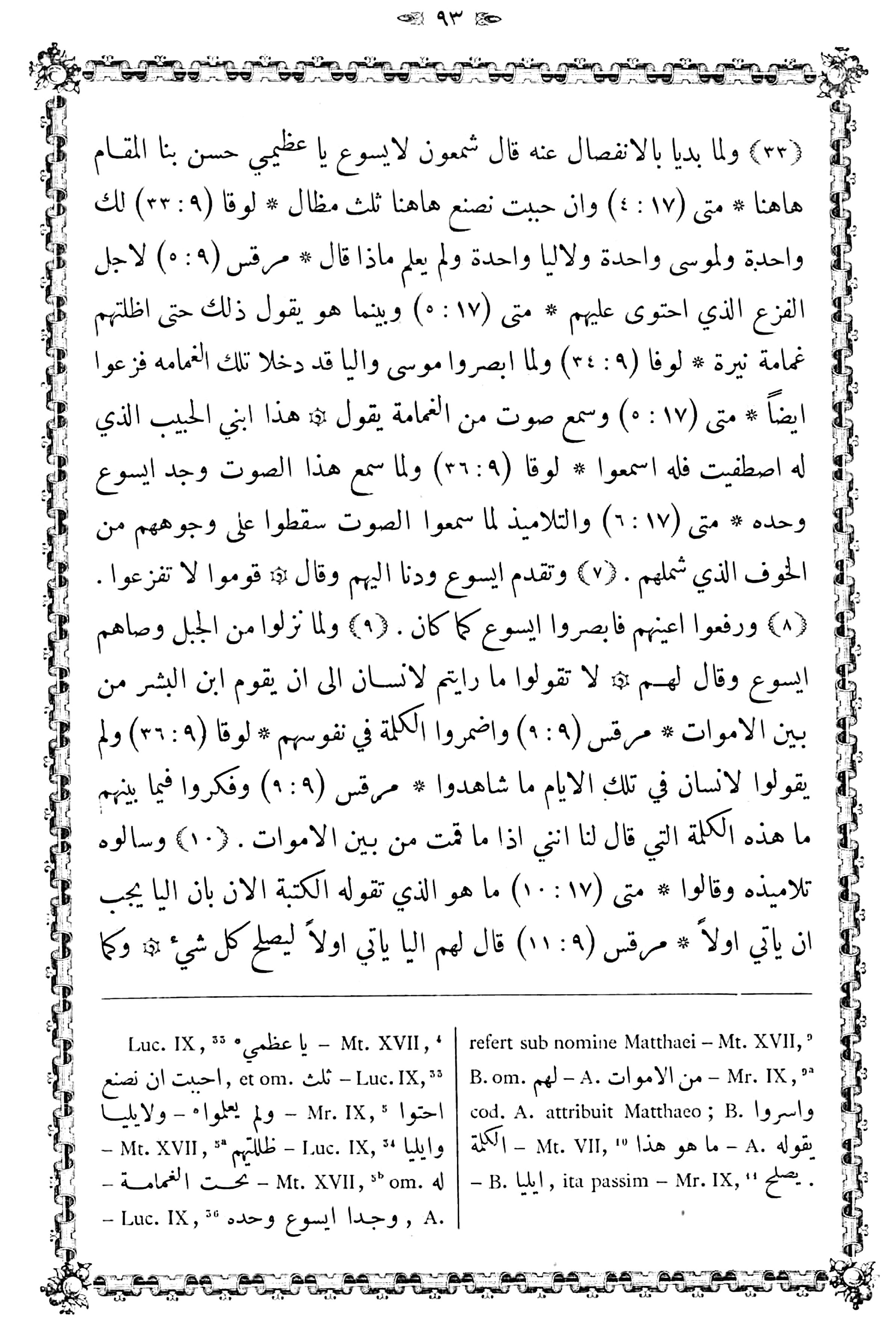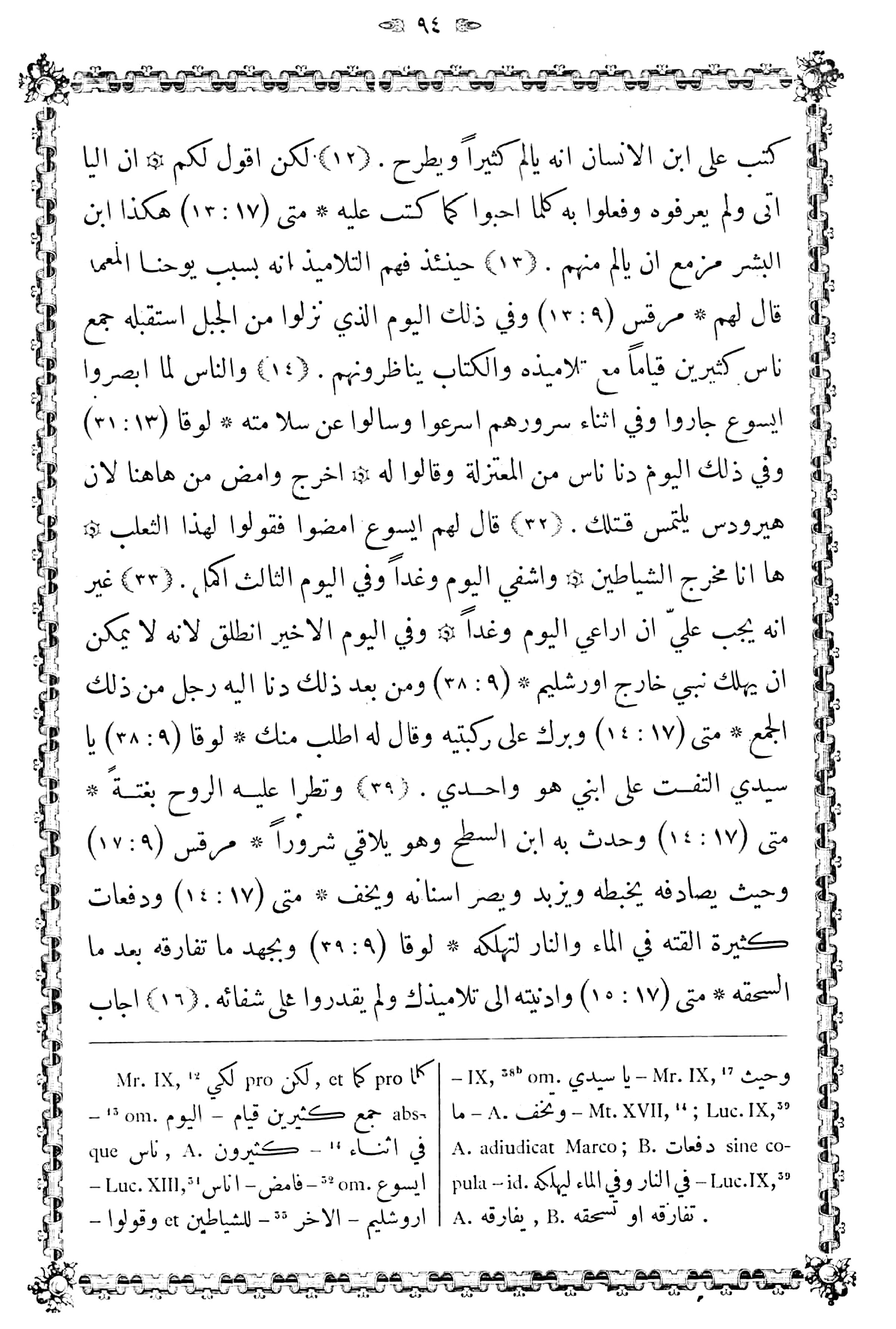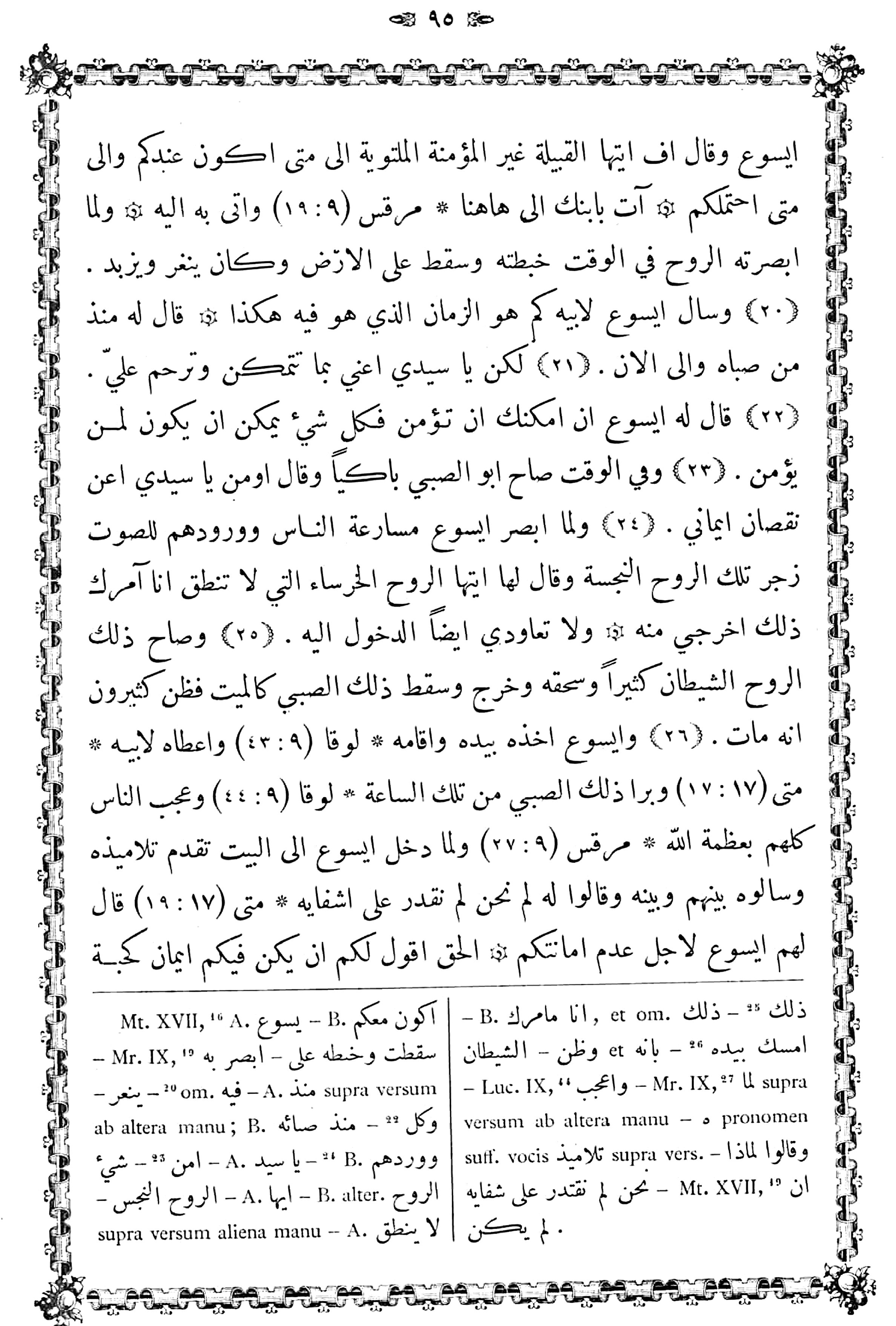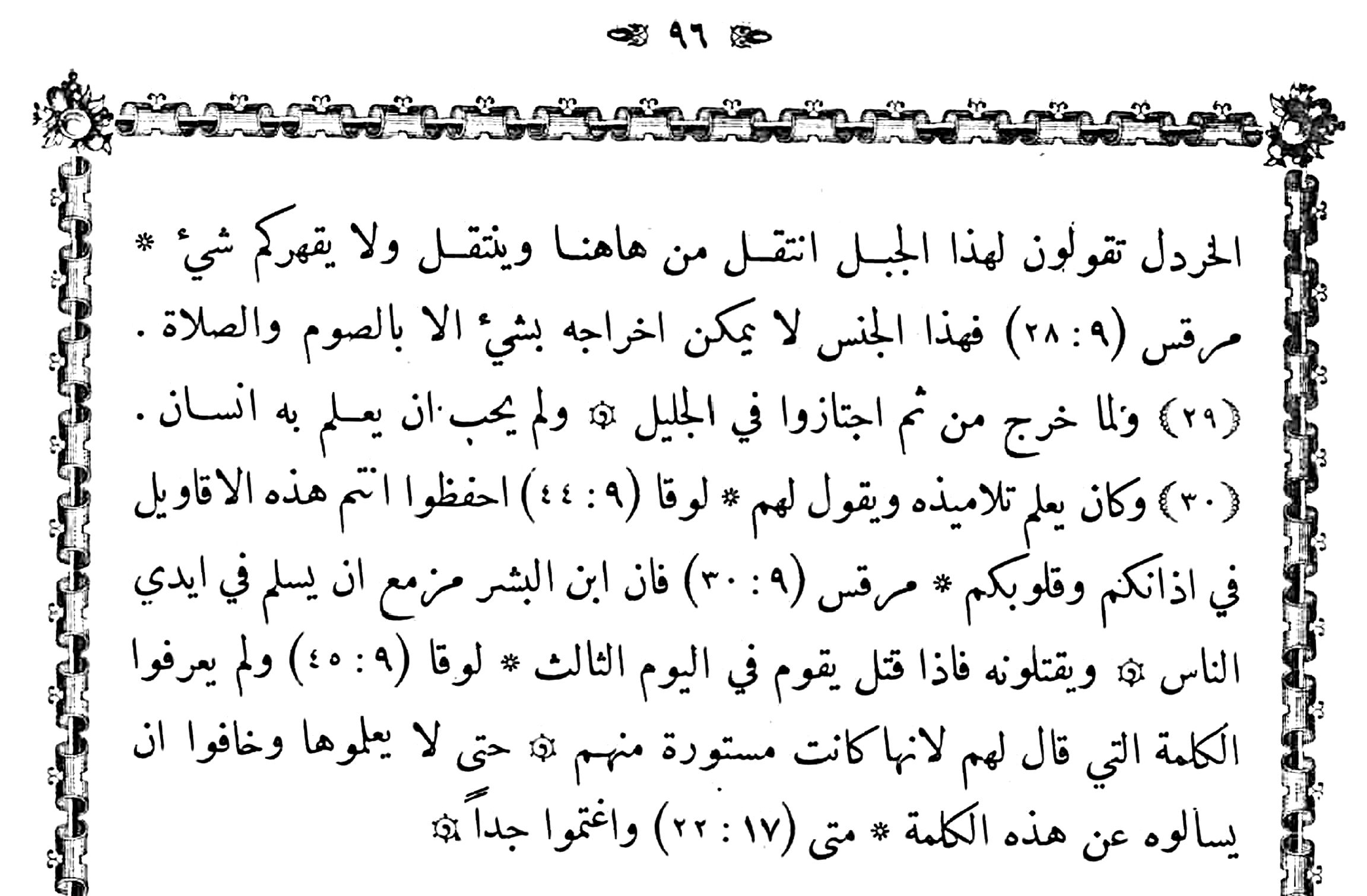
▾
Tatian, The Diatessaron
⎗←→⎘
Section XXV.
[1] 1673 Luke ix. 46.And in that day this thought presented itself to his disciples, and they said, which [2] haply should be the greatest among them.1674 Borg. ms. omits among them. 1675 Mark ix. 33.And when they came to Capernaum, and entered into the house, Jesus said unto them, What were ye considering in the [3] way among yourselves? 1676 Mark ix. 34a.And they were silent because they had considered that matter.
[4] 1677 Matt. xvii. 24b.And when Simon went forth without, those that received two dirhams for the tribute came to Cephas, and said unto him, Doth your master not give his two [5] dirhams? He said unto them, Yea. 1678 Matt. xvii. 25.And when Cephas entered the house, Jesus anticipated him, and said unto him, What thinkest thou, Simon? the kings of the earth, from whom do they receive custom and tribute? from their sons, or from [6] [Arabic, p. 97] strangers? 1679 Matt. xvii. 26.Simon said unto him, From strangers. Jesus said unto him, Children then are free. Simon said unto him, Yea. Jesus said unto him, [7] Give thou also unto them, like the stranger. 1680 Matt. xvii. 27.But, lest it trouble them, go thou to the sea, and cast a hook; and the first fish that cometh up, open its mouth, and thou shalt find a stater: take therefore that, and give for me and thee.
[8] 1681 Matt. xviii. 1.And in that hour came the disciples to Jesus, and said unto him, Who, thinkest [9] thou, is greater in the kingdom of heaven? 1682 Luke ix. 47a; Mark ix. 36.And Jesus knew the thought of their heart, and called a1683 Lit. one (Syriac idiom). child, and set him in the midst, and took him in his arms, and [10] said unto them, 1684 Matt. xviii. 3.Verily I say unto you, If ye do not return, and become as children, [11] ye shall not enter the kingdom of heaven. 1685 Luke ix. 48.Every one that shall receive in my name such as this child hath received me: 1686 Mark ix. 37b.and whosoever receiveth me receiveth [12] not me, but him that sent me. 1687 Luke ix. 48c.And he who is little in your company,1688 In the present work this word frequently means synagogue. the same [13] shall be great. 1689 Matt. xviii. 6.But whosoever shall injure one of these little ones that believe in me, it were better for him that a great millstone1690 Lit. millstone of an ass. should be hanged about his neck, and he should be drowned in the depths of the sea.
[14] 1691 Luke ix. 49.John answered and said, Our Master, we saw one casting out devils in thy name; [15] and we prevented him, because he followed not thee with us. 1692 Mark ix. 39.Jesus said unto them, Prevent him not; for no man doeth powers in my name, and can hasten to speak evil [16, 17] of me. 1693 Luke ix. 50b.Every one who is not in opposition to you is with you. 1694 Matt. xviii. 7a, c.Woe unto the world [Arabic, p. 98] because of trials!1695 i.e., experiences that test one; or, seductions. The word is variously used. but woe unto that man by whose hand the trials come! [18] 1696 Matt. xviii. 8.If thy hand or thy foot injure thee, cut it off, and cast it from thee; for it is better for thee to enter into life being halt or maimed, and not that thou shouldest have two hands or two feet, and fall into the hell of fire that burneth1697 Or, is kindled. for ever; [19, 20] 1698 Mark ix. 44.where their worm dieth not, and their fire is not quenched. 1699 Matt. xviii. 9a.And if thine eye seduce1700 See note to § 25, 17. [21] thee, pluck it out, and cast it from thee; 1701 Mark ix. 47b.for it is better for thee to enter the kingdom of God with one eye, than that thou shouldest have two eyes, and fall into the [22, 23] fire of Gehenna; 1702 Mark ix. 48.where their worm dieth not, and their fire is not quenched. 1703 Mark ix. 49.Every [24] one shall be salted with fire, and every sacrifice shall be salted with salt. 1704 Mark ix. 50a.How good [25] is salt! but if the salt also be tasteless, wherewith shall it be salted? 1705 Luke xiv. 34b; Luke xiv. 35.It is fit neither for the land nor for dung, but they cast it out. He that hath ears to hear, let him [26] hear. 1706 Mark ix. 50c.Have ye salt in yourselves, and be in peace one with another.
[27] 1707 Mark x. 1.And he arose from thence, and came to the borders of Judæa beyond Jordan: and there went unto him thither great multitudes, and he healed them; and he taught [28] them also, according to his custom. 1708 Mark x. 2.And the Pharisees came unto him, tempting [29] him, and asking him, Is it lawful for a man to put away his wife? 1709 Mark x. 3.He said, What [30] did Moses command you? 1710 Mark x. 4.They said, Moses made it allowable for us, saying, Whosoever [31] will, let him write a writing of divorcement, and put away his wife. 1711 Mark x. 5a.Jesus answered and said unto them, 1712 Matt. xix. 4.Have ye not read, He that made them from the beginning [32] made them male and female, and said, 1713 Matt. xix. 5.For this reason shall the man leave his father [Arabic, p. 99] and his mother, and cleave to his wife; and they both shall be one body? [33] 1714 Matt. xix. 6.So then they are not twain, but one body; the thing, then, which God hath [34] joined together, let no man put asunder. 1715 Matt. xix. 7.And those Pharisees said unto him, Why did Moses consent1716 So the Arabic; but the Syriac versions follow the Greek, and consent is doubtless a (very easy, and, in view of the succeeding context, natural) clerical error for an original Arabic charge. that a man should give a writing of divorcement and put her away? [35] 1717 Matt. xix. 8.Jesus said unto them, Moses because of the hardness of your hearts gave you leave [36] to divorce your wives; but in the beginning it was not so. 1718 Matt. xix. 9a.I say unto you, Whosoever putteth away1719 Or, leaveth. his wife without fornication, and marrieth another, hath exposed [37] her to adultery. 1720 Mark x. 10.And his disciples, when he entered the house, asked him again [38] about that. 1721 Mark x. 11.And he said unto them, Every one who putteth away his wife, and [39] marrieth another, hath exposed her to adultery. 1722 Mark x. 12.And any woman that leaveth her husband, and becometh another’s, hath committed adultery. 1723 Matt. xix. 9b.And whosoever marrieth [40] her that is divorced hath committed adultery. 1724 Matt. xix. 10.And his disciples said unto him, If there be between the man and the woman such a case1725 Lit. blame, a mistranslation (found also in the Brit. Mus. text of Ibn-at-Tayyib’s Commentary) of the Syriac word, which is ambiguous (cf. even the Greek). For a somewhat similar case see § 50, 11, note. as this, it is not good for [41] a man to marry. 1726 Matt. xix. 11.He said unto them, Not every man can endure this saying, except [42] him to whom it is given. 1727 Matt. xix. 12.There are eunuchs which from their mother’s womb1728 Lit. wombs. were born so; and there are eunuchs which through men became eunuchs; and there are eunuchs which made themselves eunuchs for the sake of the kingdom of heaven. He that is able to be content, let him be content.
[43] 1729 Matt. xix. 13a.Then they brought to him children, that he should lay his hand upon them, and [44] pray: and his disciples were rebuking those that were bringing them. 1730 Mark x. 13b; Mark x. 14.And Jesus saw, and it was distressing to him; and he said unto them, Suffer the children to [Arabic, p. 100] come unto me, and prevent them not; for those that are like these have [45] the kingdom of God. 1731 Mark x. 15.Verily I say unto you, Whosoever receiveth not the [46] kingdom of God as this child, shall not enter it. 1732 Mark x. 16.And he took them in his arms, and laid his hand upon them, and blessed them.
